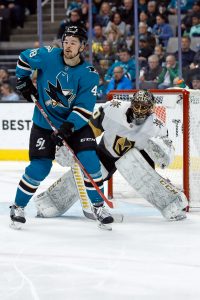The San Jose Sharks took advantage of the expansion draft frenzy by acquiring Adin Hill from the Arizona Coyotes just before the roster freeze went into effect. The Coyotes were at risk of losing Hill for nothing in the draft, so turned him into a goaltending prospect and second-round pick before Seattle had the chance to claim him. The Sharks won’t be under the same pressure and Kevin Kurz of The Athletic tweets that they are not expected to make any side-deals with the Kraken before Wednesday’s draft.
As the draft approached, it seemed more likely that the Sharks would make a deal with Seattle to take one of the team’s high-priced assets than to protect an extra player or two. Instead, they decided (or were forced) to protect all of the aging stars, not leaving much for the Kraken to choose from. If the expansion club takes someone like Dylan Gambrell, who recently re-signed with the team, it certainly wouldn’t be too painful given they were willing to trade him just a few days ago. A side-deal certainly isn’t necessary to protect any of those that are currently exposed.
One has to wonder if this is an opportunity missed, even if it would have cost the Sharks a hefty price. While Erik Karlsson and Marc-Edouard Vlasic would have been the top candidates for a side-deal trade where Seattle received something to take on their contracts, both have no-movement clauses that they would have had to agree to waive. It’s Brent Burns then that is the real discussion piece since he has no such protection. The Sharks could have left the 36-year-old defenseman available and worked on a deal for Seattle to assume the $8MM cap hit. That price would have been substantial, but given the team doesn’t have a ton of other prime targets, perhaps a trade could have been achieved.
Instead, the Sharks protected Burns and will seemingly go into another season with $26.5MM tied up in three aging defensemen. His deal, which runs through 2024-25, will actually expire first among the three. Karlsson is signed at $11.5MM through 2026-27 and Vlasic at $7MM through 2025-26. It’s going to be difficult for the Sharks to put together a contending team with that kind of money tied up. Though it would have been painful, a side deal may have been the best option.
Of course, the recent history of trading with an expansion team may be weighing heavily on the minds of many general managers around the league. In 2017, quite a few teams worked out deals with the Vegas Golden Knights to direct their expansion selections, and almost none of them paid off. In fact, many became abject failures that set up the Golden Knights for success while stripping multiple valuable assets out of the original organization. There is a chance, at least, that Burns lives up to his hefty contract for the next four seasons or that the entire group experiences a bounce-back campaign, meaning a trade would have been a huge mistake. There’s also the potential that San Jose GM Doug Wilson did try to work out something like a Burns-trade, only to be rebuffed by Kraken GM Ron Francis completely. Seattle has full say over how they construct their team and whether they want to take on any bad money at an early stage.
